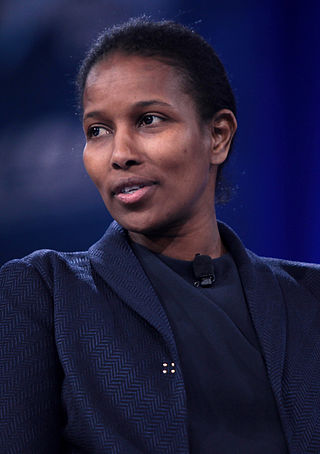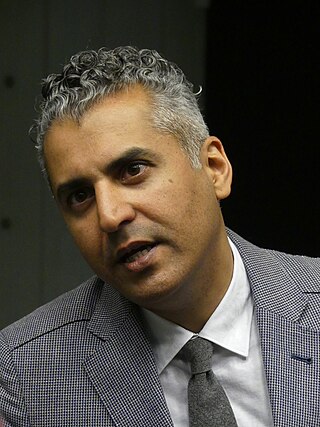Related Research Articles

In art history, literature and cultural studies, Orientalism is the imitation or depiction of aspects of the Eastern world by writers, designers, and artists from the Western world. Orientalist painting, particularly of the Middle East, was one of the many specialties of 19th-century academic art, and Western literature was influenced by a similar interest in Oriental themes.
Islamophobia is the irrational fear of, hostility towards, or hatred against the religion of Islam or Muslims in general. Islamophobia is primarily a form of religious or cultural bigotry; and people who harbour such sentiments often stereotype Muslims as a geopolitical threat or a source of terrorism. Muslims, with diverse ethnic and cultural backgrounds, are often inaccurately portrayed by Islamophobes as a single homogenous racial group.

Daniel Pipes is an American former professor and commentator on foreign policy and the Middle East. He is the president of the Middle East Forum, and publisher of its Middle East Quarterly journal. His writing focuses on American foreign policy and the Middle East as well as criticism of Islamism.

Ayaan Hirsi Ali, Lady Ferguson is a Somali-born Dutch-American writer, activist and former politician. She is a critic of Islam and advocate for the rights and self-determination of Muslim women, opposing forced marriage, honour killing, child marriage, and female genital mutilation. At the age of five, following local traditions in Somalia, Ali underwent female genital mutilation organized by her grandmother. Her father—a scholar, intellectual, and a devout Muslim—was against the procedure but could not stop it from happening because he was imprisoned by the Communist government of Somalia at the time. Her family moved across various countries in Africa and the Middle East, and at 23, she received political asylum in the Netherlands, gaining Dutch citizenship five years later. In her early 30s, Hirsi Ali renounced the Islamic faith of her childhood, began identifying as an atheist, and became involved in Dutch centre-right politics, joining the People's Party for Freedom and Democracy (VVD).

Robert Bruce Spencer is an American anti-Muslim author and blogger, and one of the key figures of the counter-jihad movement. Spencer founded and has directed the blog Jihad Watch since 2003. In 2010 he co-founded the organization Stop Islamization of America with Pamela Geller.

Timothy John Winter, also known as Abdal Hakim Murad, is an English academic, theologian and Islamic scholar who is a proponent of Islamic neo-traditionalism. His work includes publications on Islamic theology, modernity, and Anglo-Muslim relations, and he has translated several Islamic texts.

Black orientalism is an intellectual and cultural movement found primarily within African-American circles. While similar to the general movement of Orientalism in its negative outlook upon Western Asian – especially Arab – culture and religion, it differs in both its emphasis upon the role of the Arab slave trade and the Coolie slave trade in the historic relationship between Africa and the Arab – and greater Muslim – world, as well as a lack of colonial promotion over the Middle East region as was promoted by European orientalism in the same region. The term "black orientalism" was first used by Kenyan academic Ali Mazrui in his critique of Henry Louis Gates, Jr.'s documentary Wonders of the African World. Supporters of this movement include writers such as Chinweizu.

The Council of Ex-Muslims of Britain or CEMB is the British branch of the Central Council of Ex-Muslims. It was launched in Westminster on 22 June 2007.

Maajid Usman Nawaz is a British activist and former radio presenter. He was the founding chairman of the think tank Quilliam. Until January 2022, he was the host of an LBC radio show on Saturdays and Sundays. Born in Southend-on-Sea, Essex, to a British Pakistani family, Nawaz is a former member of the Islamist group Hizb ut-Tahrir. His membership led to his December 2001 arrest in Egypt, where he remained imprisoned until 2006. While there, he read books about human rights and made contact with Amnesty International who adopted him as a prisoner of conscience. He left Hizb-ut-Tahrir in 2007, renounced his Islamist past, and called for a secular Islam. Later, Nawaz co-founded Quilliam with former Islamists, including Ed Husain.
Quilliam was a British think tank co-founded in 2008 by Maajid Nawaz that focused on counter-extremism, specifically against Islamism, which it argued represents a desire to impose a given interpretation of Islam on society. Founded as The Quilliam Foundation and based in London, it claimed to lobby government and public institutions for more nuanced policies regarding Islam and on the need for greater democracy in the Muslim world whilst empowering "moderate Muslim" voices. The organisation opposed any Islamist ideology and championed freedom of expression. The critique of Islamist ideology by its founders―Nawaz, Rashad Zaman Ali and Ed Husain―was based, in part, on their personal experiences. Quilliam went into liquidation in 2021.
Mohammed Shafiq is a British media personality known for his commentary on Islam in the United Kingdom.

The Clarion Project is an American nonprofit organization based in Washington, D.C. that was founded in 2006. The organization has been involved in the production and distribution of the films Obsession: Radical Islam's War Against the West, The Third Jihad: Radical Islam's Vision For America and Iranium. These films have been criticized by some for allegedly falsifying information and described as anti-Muslim propaganda. The organization publishes a weekly "Extremism Roundup" newsletter.

A scimitar is a single-edged sword with a convex curved blade associated with Middle Eastern, South Asian, or North African cultures. A European term, scimitar does not refer to one specific sword type, but an assortment of different Eastern curved swords inspired by types introduced to the Middle East by Central Asian ghilmans. These swords include the Persian shamshir, the Arab saif, the Indian talwar, the North African nimcha, the Turkish kilij, and the Afghan pulwar. All such swords are originally derived from earlier curved swords developed in Turkic Central Asia (Turkestan).

American Muslims often face Islamophobia and racialization due to stereotypes and generalizations ascribed to them. Due to this, Islamophobia is both a product of and a contributor to the United States' racial ideology, which is founded on socially constructed categories of profiled features, or how people seem.
Islamophobia in Australia is highly speculative and affective distrust and hostility towards Muslims, Islam, and those perceived as following the religion. This social aversion and bias is often facilitated and perpetuated in the media through the stereotyping of Muslims as violent and uncivilised. Various Australian politicians and political commentators have capitalised on these negative stereotypes and this has contributed to the marginalisation, discrimination and exclusion of the Muslim community.

Regressive left, also referred to as regressive liberals or regressive leftists, is a pejorative term to describe by its proponents a branch of left-wing politics that is accused of being accepting of, or sympathetic to, views that conflict with liberal principles, particularly by tolerating Islamism and other authoritarian positions, like promoting censorship. Among those who have used the term are the British political activist Maajid Nawaz, American political talk-show hosts Bill Maher and Dave Rubin, and New Atheist writers, such as Sam Harris and Richard Dawkins.
Islamophobia/Islamophilia: Beyond the Politics of Enemy and Friend is a 2010 book edited by Andrew Shryock, published by Indiana University Press.
Islamophobia in Sweden refers to the set of discourses, behaviours and structures which express feelings of anxiety, fear, hostility and rejection towards Islam and/or Muslims in Sweden. Historically, attitudes towards Muslims in Sweden have been mixed with relations being largely negative in the early 16th century, improving in the 18th century, and declining once again with the rise of Swedish nationalism in the early 20th century. According to Jonas Otterbeck, a Swedish historian of religion, attitudes towards Islam and Muslims today have improved but "the level of prejudice was and is still high." Islamophobia can manifest itself through discrimination in the workforce, prejudiced coverage in the media, and violence against Muslims. The anti-immigration and anti-Islam Sweden Democrats is the second largest party in the Riksdag.
This is a list of individual liberal and progressive Islamic movements in Europe, sorted by country. See also Islam in Europe and Euroislam.

Ali Amjad Rizvi is a Pakistani-born Canadian atheist ex-Muslim and secular humanist writer and podcaster who explores the challenges of Muslims who leave their faith. He wrote a column for the Huffington Post and co-hosted the Secular Jihadists for a Muslim Enlightenment podcast together with Armin Navabi.
References
- ↑ Anees, Munawar A. (2015-07-24). "Neo-Orientalist Islamophobia Is Maligning the Reputation of the Prophet Muhammad Like Never Before". The Huffington Post. Retrieved 2017-02-21.
- ↑ Tuastad, Dag (2003). "Neo-Orientalism and the new barbarism thesis: Aspects of symbolic violence in the Middle East conflict(s)". Third World Quarterly. 24 (4): 591–599. doi:10.1080/0143659032000105768. JSTOR 3993426. S2CID 144367950.
- ↑ Williams, Juliet A.; Behdad, Ali (2012). "On Neo-Orientalism, Today". www.entekhabi.org. Archived from the original on 2015-09-28. Retrieved 2015-09-27.
- ↑ "Ali Behdad and Juliet A. Williams: On Neo-Orientalism, Today". www.entekhabi.org. Archived from the original on 2017-05-04. Retrieved 2017-02-21.
- ↑ Nawaz, Maajid (2016-10-29). "I'm A Muslim Reformer. Why Am I Being Smeared as an 'Anti-Muslim Extremist'?". The Daily Beast. Retrieved 2017-02-21.
- ↑ "A Journalist's Manual: Field Guide to Anti-Muslim Extremists". Southern Poverty Law Center. Retrieved 2017-02-21.